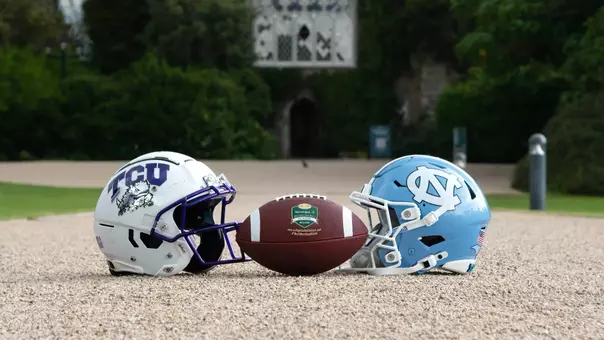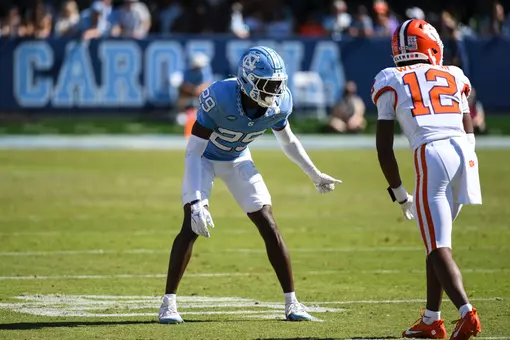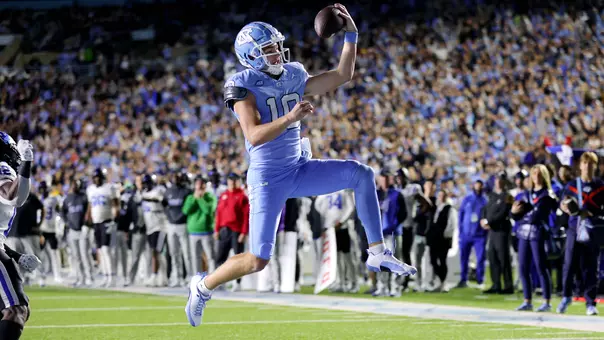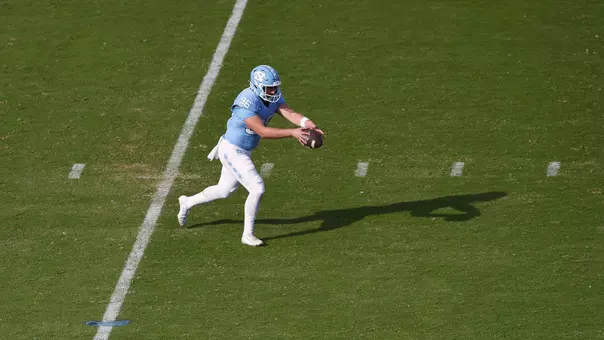University of North Carolina Athletics
Mack Brown and Johnathan Robertson
Extra Points: Professor Mack
February 25, 2019 | Football, Featured Writers
By Lee Pace
Mack Brown gazed out in a classroom of more than a hundred Carolina students Thursday morning in Gardner Hall and joked of things they knew little about.
"How many of you know what a dictionary is?" Brown asked. "Y'all have known Google from the start, and it's worked pretty well."
He told the class about the ideas he and his wife Sally generated for the architects in designing the Kenan Football Center in 1996, which opened for good in 1998, just after he'd left the head football coaching job at Carolina for Texas. "We had them put in two pay phones, because we wanted kids to be able to call their parents," Brown said. "You guys have never seen a pay phone and wouldn't know where to put the quarter if you did."
What hasn't changed, though, is the ability to communicate and connect. Brown told the students of his nightly text-messaging conversations with Tar Heel football recruits, that Brown asks if they happened to look up at the sky that day.
"What color was it?" Brown asks. "Carolina blue, right? I think God's sending you a message."
That line was met with a raucous round of laughter, amped up perhaps by the previous evening's demolition of Duke by the Tar Heel basketball team.
"It's not whether you're 67 or 27, it's whether you can communicate with people," Brown said. "That's all it is. It's communication—and doing it confidently. It's having eye-contact. It's remembering names. And it's bringing something interesting to the conversation."
Brown was visiting Econ 325 (Entrepreneurship Principles and Practices) as a guest lecturer at the invitation of Johnathan Robertson, who walked-on to the Tar Heel football team in the early 1990s and has gone on to a successful venture capitalist career in Miami. Robertson holds an undergrad degree from Carolina and a Juris Doctorate from Harvard and is the president and managing director of TG Capital in Miami. Robertson was asked by the leaders of the Shuford Program in Entrepreneurship in the College of Arts & Sciences to teach a one-day class on negotiation and recruitment. He said he would and brought Brown into the mix, citing the fact that Brown has successfully negotiated with approximately 1,134 high school football players to come join his programs at four schools, most notably Carolina and Texas, over some three decades as a head coach.
"Who better to address this class than Coach Brown?" Robertson says. "Having persuaded over 1,000 players and assistant coaches to say 'Yes,' he has a unique perspective on how to attract talent."
Brown gave the students a handful of nuggets from the recruiting and program management arenas that would apply to any discipline—certainly those of entrepreneurism and running a business.
* "My granddad used to say that people will make sixty percent of the impression of what they think of you in the first 60 seconds. So dress clean. You might not have money for expensive clothes, but you can be clean and your clothes pressed. Present yourself well."
* Brown said he's met four of the last five Presidents of the United States (save Donald Trump). "You talk to them and they focus on youand nothing else. Make great eye contact. If you're talking to someone and your eyes are wandering to the next conversation, that's an insult."
* He asks every recruit what other schools they are considering and can usually tell how interested they are in the value of education from the answer. "Then I ask them, 'Are you making a four-year decision or a 40-year decision? If it's a 40-year decision, think of all the bright kids you're going to be around in Chapel Hill. Think of all the options and opportunities you're going to have with these bright people. One day, God's going to take your legs and you'd better have some options.'"
* Robertson and Brown talked of the benefits of preparation, not just on the athletic field but, in Brown's case, before making an in-home recruiting visit—which could translate in the real world to a business pitch or sales call. He presses his assistant coaches for information—who will be there, what are their roles and influences, who's the ultimate decision-maker?
"You have to know everybody in the room," Brown says. "Names are so important. I want to know everyone. And if you mess up a name, that's okay. Make a joke about it. But that will help you remember that name."
It's important to make the family feel at ease, to not overdress in some cases. "And if Mom's cooking, go hug her and help in the kitchen."
* A red flag immediately pops up if a parent asks, "What can you do for us?" if the implication is more than the scholarship allowed by NCAA rules. "If they say, 'Coach, so and so just offered us a car,' then if they're interested in that car, it's not within the rules and I'm out. I get up and leave, immediately."
* Another warning sign is a prospect who's worried about other players at his position.
"If they're worried about competition, they're never going to make it. They're not confident enough."
* Brown won't leave the visit without asking the prospect a thoughtful question and making an appointment to call him back and discuss the answer. "Don't just say, 'Enjoyed it, talk soon.' Don't leave them hanging. I might tell a kid, 'You make a list of everyone you're talking to and why.' I'll call you at 5 o'clock tomorrow and we'll talk about it."
* Brown counseled the students that in making a hiring decision, make sure you consider who else in the candidate's life is part of the package. "I would never hire a coach without bringing their spouse in," Brown says. "If an assistant coach has a wife who's griping all the time and hard to deal with at home, it's a problem for me. Never bring a coach in without bringing his wife. I would never hire someone without knowing the family, because the family can be an issue."
* Ultimately, Brown said, the most important element to recruiting players or hiring staff "is getting people who fit. Fit is a small word that has big connotations. They have to fit the university. They have to fit the style of people that we want, they have to fit the style of play that we want. They have to fit the numbers we have available at the different positions. And they have to fit a set of athletic abilities before we'll take them."
Brown's part of the class was an entertaining and enlightening 45 minutes, capped off with a photo and autograph session and each student getting a copy of the book Getting to Yes—Negotiating Agreement without Giving In, compliments of Robertson.
"The recruiting lessons and negotiation principles he conveyed to the students are all extremely applicable to entrepreneurial students as they start their own organizations, hire and recruit, and negotiate with vendors and customers," Robertson says. "Coach Brown has a tremendous ability to relate to students and turn his experience into actionable advice."
There wasn't much pure football talk, though Brown did say that the pitch to get QB Sam Howell of Monroe to flip from Florida State to Carolina was that Howell should stay in his home state, that the Tar Heels will run a fun and exciting offense and that there's no one established at that position.
"People don't want to give their word and break it, and I don't like flipping people because it means I'm asking them to break their word," Brown says. "What we had to do was give him reasons to do that. We don't make promises. But we do promise opportunity."
Obviously that worked as Howell enrolled in January and will participate in spring practice when it starts March 3. At last—after recruiting, beating Duke in hoops and helping teach Econ 325, Mack Brown is itching to get back to the business of coaching football.
Lee Pace (Carolina 1979) has been writing "Extra Points" since 1990, conceiving it in the wake of Mack Brown's 2-20 beginning as the Tar Heels' head coach. Write him at leepace7@gmail.com and follow him @LeePaceTweet.
Mack Brown gazed out in a classroom of more than a hundred Carolina students Thursday morning in Gardner Hall and joked of things they knew little about.
"How many of you know what a dictionary is?" Brown asked. "Y'all have known Google from the start, and it's worked pretty well."
He told the class about the ideas he and his wife Sally generated for the architects in designing the Kenan Football Center in 1996, which opened for good in 1998, just after he'd left the head football coaching job at Carolina for Texas. "We had them put in two pay phones, because we wanted kids to be able to call their parents," Brown said. "You guys have never seen a pay phone and wouldn't know where to put the quarter if you did."
What hasn't changed, though, is the ability to communicate and connect. Brown told the students of his nightly text-messaging conversations with Tar Heel football recruits, that Brown asks if they happened to look up at the sky that day.
"What color was it?" Brown asks. "Carolina blue, right? I think God's sending you a message."
That line was met with a raucous round of laughter, amped up perhaps by the previous evening's demolition of Duke by the Tar Heel basketball team.
"It's not whether you're 67 or 27, it's whether you can communicate with people," Brown said. "That's all it is. It's communication—and doing it confidently. It's having eye-contact. It's remembering names. And it's bringing something interesting to the conversation."
Brown was visiting Econ 325 (Entrepreneurship Principles and Practices) as a guest lecturer at the invitation of Johnathan Robertson, who walked-on to the Tar Heel football team in the early 1990s and has gone on to a successful venture capitalist career in Miami. Robertson holds an undergrad degree from Carolina and a Juris Doctorate from Harvard and is the president and managing director of TG Capital in Miami. Robertson was asked by the leaders of the Shuford Program in Entrepreneurship in the College of Arts & Sciences to teach a one-day class on negotiation and recruitment. He said he would and brought Brown into the mix, citing the fact that Brown has successfully negotiated with approximately 1,134 high school football players to come join his programs at four schools, most notably Carolina and Texas, over some three decades as a head coach.
"Who better to address this class than Coach Brown?" Robertson says. "Having persuaded over 1,000 players and assistant coaches to say 'Yes,' he has a unique perspective on how to attract talent."
Brown gave the students a handful of nuggets from the recruiting and program management arenas that would apply to any discipline—certainly those of entrepreneurism and running a business.
* "My granddad used to say that people will make sixty percent of the impression of what they think of you in the first 60 seconds. So dress clean. You might not have money for expensive clothes, but you can be clean and your clothes pressed. Present yourself well."
* Brown said he's met four of the last five Presidents of the United States (save Donald Trump). "You talk to them and they focus on youand nothing else. Make great eye contact. If you're talking to someone and your eyes are wandering to the next conversation, that's an insult."
* He asks every recruit what other schools they are considering and can usually tell how interested they are in the value of education from the answer. "Then I ask them, 'Are you making a four-year decision or a 40-year decision? If it's a 40-year decision, think of all the bright kids you're going to be around in Chapel Hill. Think of all the options and opportunities you're going to have with these bright people. One day, God's going to take your legs and you'd better have some options.'"
* Robertson and Brown talked of the benefits of preparation, not just on the athletic field but, in Brown's case, before making an in-home recruiting visit—which could translate in the real world to a business pitch or sales call. He presses his assistant coaches for information—who will be there, what are their roles and influences, who's the ultimate decision-maker?
"You have to know everybody in the room," Brown says. "Names are so important. I want to know everyone. And if you mess up a name, that's okay. Make a joke about it. But that will help you remember that name."
It's important to make the family feel at ease, to not overdress in some cases. "And if Mom's cooking, go hug her and help in the kitchen."
* A red flag immediately pops up if a parent asks, "What can you do for us?" if the implication is more than the scholarship allowed by NCAA rules. "If they say, 'Coach, so and so just offered us a car,' then if they're interested in that car, it's not within the rules and I'm out. I get up and leave, immediately."
* Another warning sign is a prospect who's worried about other players at his position.
"If they're worried about competition, they're never going to make it. They're not confident enough."
* Brown won't leave the visit without asking the prospect a thoughtful question and making an appointment to call him back and discuss the answer. "Don't just say, 'Enjoyed it, talk soon.' Don't leave them hanging. I might tell a kid, 'You make a list of everyone you're talking to and why.' I'll call you at 5 o'clock tomorrow and we'll talk about it."
* Brown counseled the students that in making a hiring decision, make sure you consider who else in the candidate's life is part of the package. "I would never hire a coach without bringing their spouse in," Brown says. "If an assistant coach has a wife who's griping all the time and hard to deal with at home, it's a problem for me. Never bring a coach in without bringing his wife. I would never hire someone without knowing the family, because the family can be an issue."
* Ultimately, Brown said, the most important element to recruiting players or hiring staff "is getting people who fit. Fit is a small word that has big connotations. They have to fit the university. They have to fit the style of people that we want, they have to fit the style of play that we want. They have to fit the numbers we have available at the different positions. And they have to fit a set of athletic abilities before we'll take them."
Brown's part of the class was an entertaining and enlightening 45 minutes, capped off with a photo and autograph session and each student getting a copy of the book Getting to Yes—Negotiating Agreement without Giving In, compliments of Robertson.
"The recruiting lessons and negotiation principles he conveyed to the students are all extremely applicable to entrepreneurial students as they start their own organizations, hire and recruit, and negotiate with vendors and customers," Robertson says. "Coach Brown has a tremendous ability to relate to students and turn his experience into actionable advice."
There wasn't much pure football talk, though Brown did say that the pitch to get QB Sam Howell of Monroe to flip from Florida State to Carolina was that Howell should stay in his home state, that the Tar Heels will run a fun and exciting offense and that there's no one established at that position.
"People don't want to give their word and break it, and I don't like flipping people because it means I'm asking them to break their word," Brown says. "What we had to do was give him reasons to do that. We don't make promises. But we do promise opportunity."
Obviously that worked as Howell enrolled in January and will participate in spring practice when it starts March 3. At last—after recruiting, beating Duke in hoops and helping teach Econ 325, Mack Brown is itching to get back to the business of coaching football.
Lee Pace (Carolina 1979) has been writing "Extra Points" since 1990, conceiving it in the wake of Mack Brown's 2-20 beginning as the Tar Heels' head coach. Write him at leepace7@gmail.com and follow him @LeePaceTweet.
Hubert West: 2026 Tar Heel Trailblazer
Wednesday, February 18
UNC Baseball: Tar Heels Shut Down Richmond, 10-0
Wednesday, February 18
WBB: Post-Duke Conference - Feb. 15, 2026
Sunday, February 15
UNC Women's Basketball: Tar Heels Fall at Duke, 72-68
Sunday, February 15














